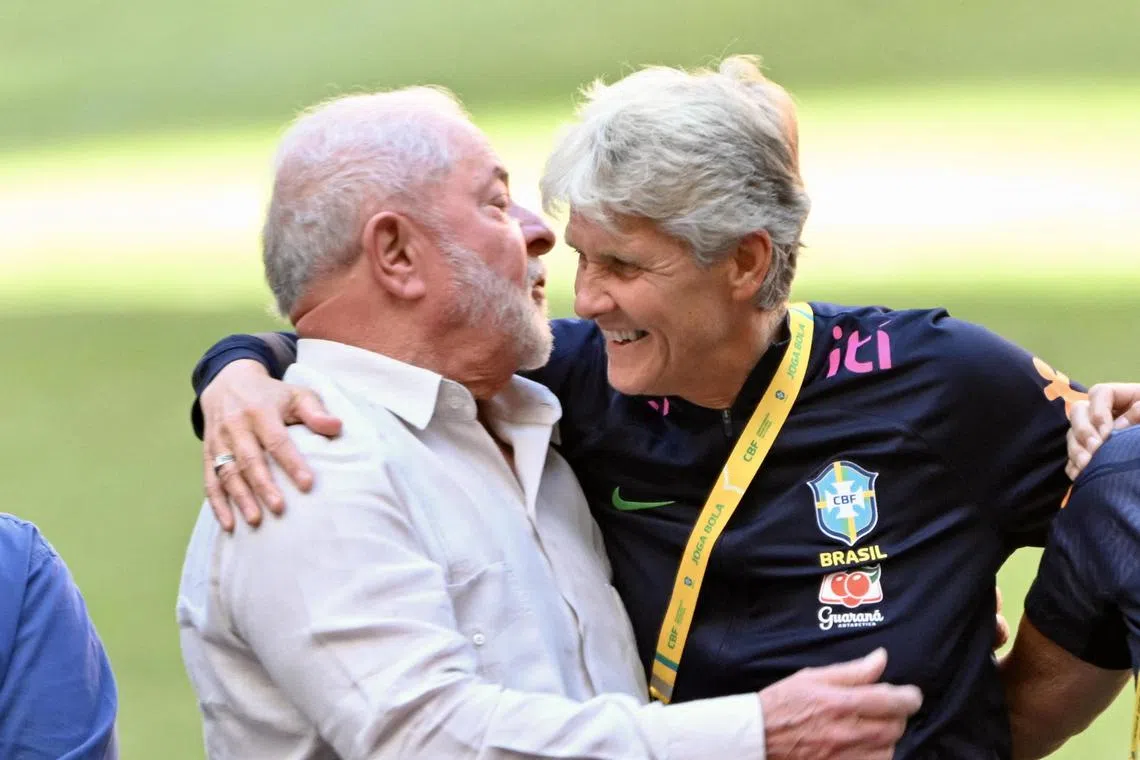Low in numbers but female coaches thrive at major tournaments
Sign up now: Get ST's newsletters delivered to your inbox

Brazilian President Luiz Inacio Lula da Silva (left) with Brazil's Swedish coach Pia Sundhage in Brasilia, on July 1.
PHOTO: AFP
Follow topic:
MANCHESTER – From Pia Sundhage to Sarina Wiegman to Bev Priestman, the Women’s World Cup is a glittering showcase of some of the game’s most successful coaches, but 20 of the 32 teams will still have men barking the orders from the touchline.
Twelve female coaches represents a record number for the global showpiece, and is a significantly higher proportion than in most other sports, but some are questioning why it is still not greater.
Vicky Huyton, founder of the Female Coaching Network, said a lack of success was certainly not a factor.
Since 2000, all but one of the major women’s football tournaments – the Women’s World Cup, Women’s Euro and the Olympics – have been won by female-coached teams, she pointed out.
Norio Sasaki, the man who coached Japan to World Cup gold in 2011, is the sole exception.
“It’s a stat I find fascinating – and it’s a trend across many different sports, but particularly in women’s football,” Huyton said.
Football’s female coaching landscape is a good news/bad news scenario. Women coaches make up 37.5 per cent at the World Cup, which kicked off on Thursday, the same as in 2019 and slightly higher than 2015.
“It’s one of the better sports for female coaches,” Huyton added. “Which is kind of like saying it’s the best of a bad bunch rather than necessarily a positive thing.”
At the other end of the scale are athletics, rugby and tennis. Fewer than 1 per cent of athletics coaches at the world championships or Olympics are women, Huyton said, and only 4 per cent of the top 200 women on the WTA Tour are coached by women.
Huyton also worries about the lack of new faces among the women who have a top job in international football.
Sundhage, a 63-year-old Swede who helms Brazil, led the US to back-to-back Olympic golds.
Wiegman, 53, coached the Netherlands to the 2017 Euro title and World Cup silver in 2019 before leading England on a 30-game unbeaten streak. Germany’s Martina Voss-Tecklenburg, 55, also coached Switzerland for six years.
Canada midfielder Sophie Schmidt said the mere sight of a dozen female coaches pacing the touchlines Down Under could be a big boost to young women looking to take that career path.
“This visibility is huge for inspiring others... it allows people to see the possibilities,” she said.
Among the biggest barriers to coaching, Huyton said, is certification. The top-level Uefa Pro Licence course costs close to £10,000 (S$17,000) and applicants must have a full-time coaching position at the senior level.
Players’ union Fifpro’s director for global policy and strategic relations for women’s football, Sarah Gregorius, said there should be “inclusive policies” in the way coaches are recruited.
“There needs to be pathways for people from all different backgrounds, genders, identities, whatever it may be, to reach those positions,” she added. REUTERS

